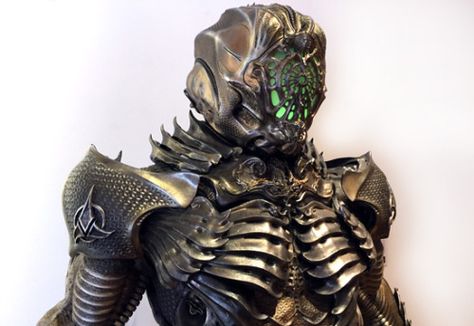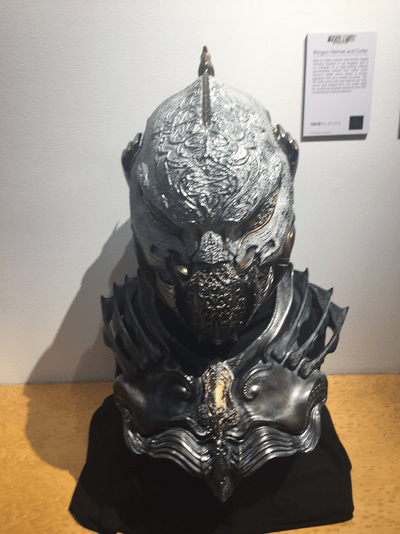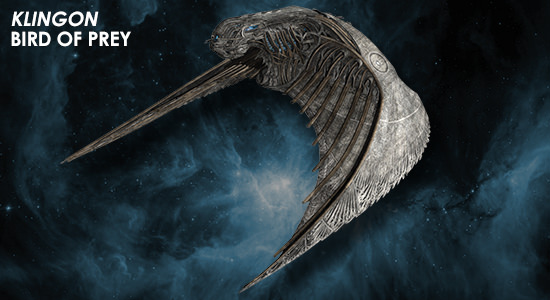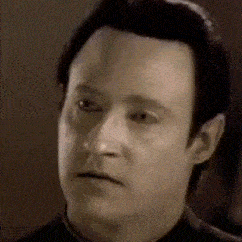I am the kind of person who enjoys “big weird” scifi like Stanisław Lem. Stories about trying to relate to and find common ground with something so alien that the prospect of even understanding is basically hopeless. Star Trek usually doesn’t do stories that, which makes sense as it often uses alien races as allegories or stand-ins for real-world human relations.
That said- I thought those early Klingons were super weird and scary because they were just so alien. It really made sense thinking about how it took a century before they could get to the events of Star Trek VI, and it made the Khittomer accords feel like so much more of an accomplishment. Like- you made a treaty with WHAT?
And just aesthetically their ships and armor looked like something out of HP Lovecraft or HR Geiger:



This is not to say I dislike how Klingons were portrayed previously, kinda like Mongols in TOS or Vikings in DS9, just that they never felt scary to me. They never felt like warriors. I was never afraid for the gallant crew of the Enterprise D (a science and exploration vessel) going into battle against Klingons. But I really enjoyed the alien-ness Disco tried to go with. Anyone else with me?
EDIT: PEOPLE I SAID WHO’S WITH ME NOT WHO ISN’T CM’ON 


All that needed to be maintained was that the Klingons we see Kirk face in TOS were all afflicted by the virus - while it’s still reasonable to assume that, the presence of these hitherto unseen 3rd variant of Klingon complicates instead of simplifies, which is what ENT’s arc did. Now what, it’s ANOTHER coincidence that THESE klingons are even ridgier than we’ve seen before, but the other ones are still out there? To borrow your parlance, the Discovery redesign was intended to overwrite and replace what came before, because apparently Star Trek, unlike every other fantasy and science fiction thing I like, is Forbidden from being treated like a secondary world that should have its own internal consistency.
I was completely content to accept it was a coincidence that Kirk only saw augment virus-impacted Klingons in TOS, just like how ST Picard ended up establishing for Romulans (northern vs southern to explain the v shape bone ridge they had through TNG-ENT).
Nonsense-- other long-running universes encounter retcons and visual redesigns all the time. Quick, how old was Dick Grayson when he first became Robin? What color is Superman’s S? How old was Magneto during the Holocaust? What happened to Luke’s father? Did James Bond fight in World War 2, or participate the Cold War?
As far as I know, those examples all either explicitly exist or are treated as seperate and distinct when you look at their wikis. Comic book continuity sometimes is something the characters are aware of too, so differences are also explained. Crisis on Infinite Earths comes to mind.
Then as someone who does know a lot about this stuff I can tell you that you are making a lot of assumptions that are not the case.
Any example I can think of I have an answer for that solves any sort of continuity issue. Events change because of actual meddling in events and in-universe continuity resets. Events contradict each other between comics and TV and movies because they for all intents and purposes, are as seperate from each other’s continuity as Star Wars and Babylon 5.
James Bond, for instance, is a different person from each actor to have played him, in addition to the version from the novels by Ian Fleming. His backstory can change between them, drastically. It doesn’t make it in the same category as Discovery Klingons.
That’s not canonical, merely a popular theory.
How many other Science Fiction properties out there sprung out of a low budget TV show from the 60s but are still producing content in the same continuity without some kind of explicit reboot?
Star Wars is the classic comparison in all sorts of ways, and for better or worse Star Wars avoids this problem entirely by 1) having a much higher budget relative to the number of sets and costumes required for it’s initial installment, 2) having picked an aesthetic that is crude, gritty, and seemingly practical which escapes looking dated many years after the fact, and 3) not being set in our future where the advances of modern tech make obviously retro elements look ridiculous.
There is Doctor Who, and that’s it.
Actually, DW is a good example, because the continuity of that show is a mess, and very intentionally so. That show thrives in its inconsistencies. There are three different explanations for why the Doctor can change faces when he dies, for example. And each one contradicts the others. There is also no beta canon, every tie in is considered canon. So the doctor has officially met Batman, Gandalf and Picard. That’s canon.
In the end IP is a playground and continuity should enhance story. Nobody gains anything from lore for the sense of lore. What does the Klingons always looking a certain way say? Not all that much. It’s a nice to have, because it allows you to recognise them quickly and make connections. But if the look is constricting for the creative team, then they should be able to change it.
Dr Who’s visual continuity on the other hand is pretty strong when bringing back old creatures. Daleks still look like they did in 1965, the Sontarians as they did in 1973, the Zygons as they did in 1975, etc. The only race that got a major change was the Cybermen which was explained by being an alternative universe version. Even they eventually cycled round to their original 1966 look by the end of Capaldis era.
I mean… not that much. Daleks have gone through three redesigns just since the show went back. Sontarans went from the world’s most unconvincing rubber masks to makeup. And how many eyes do Silurians have-- two, or three?
The point is though that DW confirms again and again that how things looked is accurate. We see a 70s Cyberman helmet in 2005, before we see the Modern Cyberman. We’ve seen the Dalek redesigns happen, and past designs all the way back to the 60s reappear.
Sontarans are a clone race, so its not difficult to imagine changes happened to their process or gene template over time. Perhaps one day we’ll see a mixed Sontaran fleet with the short stocky guys from Series 4 and the taller ones from Classic Who and Chibnal. Perhaps Silurians have different subspecies. Those are easy, one sentence explanations, that don’t rely on scoffing at old SFX and going “well its broken already anyways”.
Doctor Who has faithfully recreated sets, props, and costumes from as far back as the 60s as recently as 2017. Continuity is a different story - there’s literally no doctor who canon - as the constant time traveling impacts things. Even the smaller TARDIS exterior from the Classic series is referenced as an actual, visual difference by the revival series. The current powers that run Star Trek would just pretend it was always that big.
I’ll never accept the idea that it’s okay to update a design but not properly reboot it and set it in a completely different and seperate continuity just because what you’re making a spin-off of is old enough that it doesn’t deserve to be treated legitimately. How many more years before the crude, gritty aesthetic of Star Wars suffers the same fate as the crude and campy aesthetic of Star Trek?
Whole series of television shouldn’t be ignored by their own spinoffs just because their set designer and marketing teams decided something was lame or uncool.
People complained about exactly that during the Prequel Trilogy.
To give credit where it’s due, RotS and many of the Disney-era Star Wars products have gone a long way to fitting the glamorous, shiny prequel aesthetic into the gritty, used, “lived in” aesthetic of the OT. I’m not the biggest fan of The Last Jedi, but I actually think the implicication of the shiny galaxy just being a property of the rich inner rim planets was a great move in unifying everything.
There’s also the idea that the Empire mass produced everything to a cheaper quality which lead to less frills and faster decay. Supposedly The Acolyte show is gonna extrapolate from this further, and is set like 300 years before the prequels.